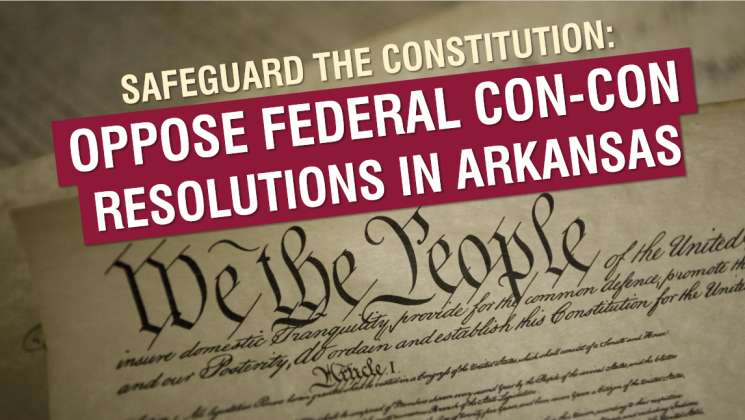

Stop Arkansas Federal Constitutional Convention Resolution HJR 1004
Legislative Alerts

Members of the Arkansas General Assembly are seeking to pass HJR 1004, which would apply for an Article V constitutional convention (Con-Con).
Contact your state legislators
Please help stop HJR 1004 by contacting your state legislators. Urge them to oppose an Article V constitutional convention and to vote against all resolutions calling for one. Inform them of the dangers of a Con-Con and of the benefits of using nullification instead.
Why it Matters
URGENT; ACT NOW: HJR 1004, a resolution applying to Congress to call a federal constitutional convention, is advancing in the Arkansas House of Representatives, and could receive a floor vote with very short notice. Contact your state representative and senator, and urge them to oppose this dangerous resolution.
House Joint Resolution 1004 (HJR 1004) would apply to Congress for a convention to propose a constitutional amendment establishing “a limit on the number of terms that a person may be elected as a member of the [U.S. House and Senate].”
HJR 1004 claims it is “limited to” its listed topic. However, any Article V convention, no matter how well intentioned, could lead to a runaway convention that would reverse many of the Constitution’s limitations on government power and interference. In other words, a Con-Con could accomplish the same goals that many of its advocates claim to be fighting against. As evidence, both a 2016 and 2023 simulated “Convention of States” resulted in amendments massively increasing the federal government and expanding its spending powers.
When speaking to your legislators, emphasize the following irrefutable facts about an Article V convention for proposing amendments:
- There is no constitutional authority for a limited convention.
- There is no guidance on how delegates would be selected.
- There is no guidance on who could qualify as a delegate.
- There is no guidance on how many delegates each state could send.
- There is no provision for stopping a runaway convention.
- There is no provision for how rules would be established.
- There is no provision for how rules would be enforced.
- There is no role provided for the people to play in the process.
- There is no power provided for the people to stop a convention once it starts.
- There is no description of the ratification conventions Congress could choose to call.
- There are no rules governing the ratification conventions Congress could choose to call.
- There is no means provided for either the states or the people to challenge Congress’s choice of the method of ratification.
- There is no test provided for a qualifying application submitted by a state.
- The acceptance by one Congress of a state application for a convention does not bind subsequent Congresses from accepting that application.
- Application for a convention submitted by one state legislature does not prevent subsequent state legislatures from revoking the previous application.
- All these issues would be challenged in court and would take years to be decided.
- The issues to be addressed at a convention to propose amendments would likely be moot by the time the challenges reached the U.S. Supreme Court for final adjudication.
- If 100 percent of registered voters opposed an amendment proposed by a convention, but the requisite number of state legislatures or ratifying conventions (according to the process determined by Congress for consideration of proposed amendments) supported it, then that amendment would become part of the Constitution regardless of the will of the people.
- The same scenario is true if a proposed amendment were approved by 100 percent of registered voters but rejected by the ratification conventions or state legislatures (according to the process determined by Congress for consideration of proposed amendments).
The late Supreme Court Justice Antonin Scalia understood the danger of a constitutional convention. In 2015, Scalia reiterated his opposition to an Article V convention, stating “this is not a good century to write a constitution.” Furthermore, what kind of delegates would Arkansas send to such a convention? Constitutionalist conservatives or RINO moderates and liberals?
In 1979, then-U.S. Senator Barry Goldwater of Arizona, correctly warned about an Article V convention:
If we hold a constitutional convention, every group in the country — majority, minority, middle-of-the-road, left, right, up, down — is going to get its two bits in and we are going to wind up with a constitution that will be so far different from the one we have lived under for 200 years that I doubt that the Republic could continue.
Goldwater considered an Article V Convention threatening to the continuity of the United States’ republican form of government. It would be foolhardy and downright reckless to disregard these and other legitimate concerns.
An Article V convention possesses the inherent power to propose any changes to the U.S. Constitution, including drafting and proposing an entirely new “modern” (i.e. socialist) constitution. Instead, the Arkansas General Assembly should consider Article VI and nullify unconstitutional laws.
Furthermore, state lawmakers should also consider rescinding any and all previously passed Article V convention applications to Congress, regardless of the desired amendment(s). Passing rescission resolutions will help prevent aggregating past Article V convention applications with those from other states to force Congress to call a convention.
Above all, urge your state representative and senator to oppose HJR 1004 and all other Article V convention resolutions, and to instead consider nullification as a safe and constitutional means to limit government.

